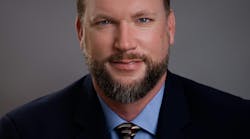PHILADELPHIA, PA -- For physical security vendors and CSOs alike, trekking into the jungle known as security convergence is much like being a missionary among the natives. At least that's the prevailing mood among several of those attending the SecureWorld Expo & Security Convergence Seminar Series in Philadelphia this week. This is the second of eight security convergence seminar/expo events around the country for 2006. The next venue is in Atlanta at the Cobb Galleria Center on May 2-3, which will then be followed by the Chicago SecureWorld Expo at the Navy Pier on May 24-25.
Despite the rapid pace of converging technologies and security management, the impact of this evolving movement has left those in the physical security sector wondering if the other side of the house is really listening.
"We have not come anywhere close to converging either technology or security management function," said William Birks, CPP, senior director of corporate loss prevention for healthcare giant McKesson Corporation. "In fact, our two departments could not be further apart. Our [physical and IT] security departments are separate but equal when it comes to responsibility, but cooperation and convergence are two different things. We have a ways to go."
Birks noted that his company has a sizeable global video surveillance initiative in the works but neither corporate security nor IT has coordinated the logistics. "Basically we have not had significant discussions on where we are going with putting video on the network. We have two totally different departments following different agendas," he said.
Eileen Wieber, corporate security director of Unisys, empathized with Birks' situation. She admitted that in the past her company's security profile resembled that of her colleagues. It wasn't until a collaborative effort on a one-card access control system changed the corporate security landscape.
"We established a corporate security advisory council that holds discussions concerning the direction we take for evaluating and dealing with all risk issues," Wieber said. "But we are still not a converged security department. We have a strong cooperative work ethic, but we are two groups that set their own boundaries."
Despite the lack of immediate convergence strategies at their own companies, both Birks and Wieber believe their respective organizations are headed in the right direction and that a converged security solution is on the horizon. For physical security vendors like Paul Novak, vice president of industry solutions sales for Pelco, a global leader in high-end video systems, there is confidence that convergence is on the horizon. Novak admits that he and others in the physical security space are sailing into uncharted waters when they attend events like SecureWorld, which are primarily stocked with IT savvy attendees.
"What we are bringing to the table is something new to the average CIO," said Novak. "They may be interconnected to the technology we have, but they are certainly not sold on it. IT professionals have a lot on their plates already and they are not afraid to ask what the ROI is when it comes to evaluating [physical] security technology. That is the IT culture.
"Things are changing on a daily basis," added Novak. "It is a sort of 'hyper-change' that makes it extremely difficult for the IT department keep up. But whatever direction they take they want to make sure what they pick works. So the big question IT professionals are asking is what technology can they trust to put on their network."
Novak acknowledged that Pelco and others in his space are taking a new message to the masses.
"It is a whole new world out there. We are dealing with security professionals who need our technology, but they don't know Pelco. We need to be at events like this [SecureWorld] because IT is an integral part of the [buying] process," he said, "CIOs are getting information from a lot of sources. They are hearing from the Ciscos, the Avayas, the AT&Ts. At the end of the day we need to figure out a way to get our message across."
Dave Valyo, the Vanguard Group's director of security, health and safety, has seen his company's increased dependence on web-based business move it closer to converged security solutions.
"I come from a traditional security shop; from guards to fire life/safety," explained Valyo. "We have not merged or converged security departments, but there is one issue common to our company's risk and survival that is moving us closer to that convergence goal."
Because Vanguard Group is encouraging more of its customers to conduct online financial transactions, Valyo said what had primarily been simple check and paper fraud has now been replaced with Internet fraud and identity theft.
"This has changed the entire security equation," said Valyo. "Traditional security needs IT's help to deal with online fraud issues. These new risks bridge all security functions. Convergence is inevitable."

